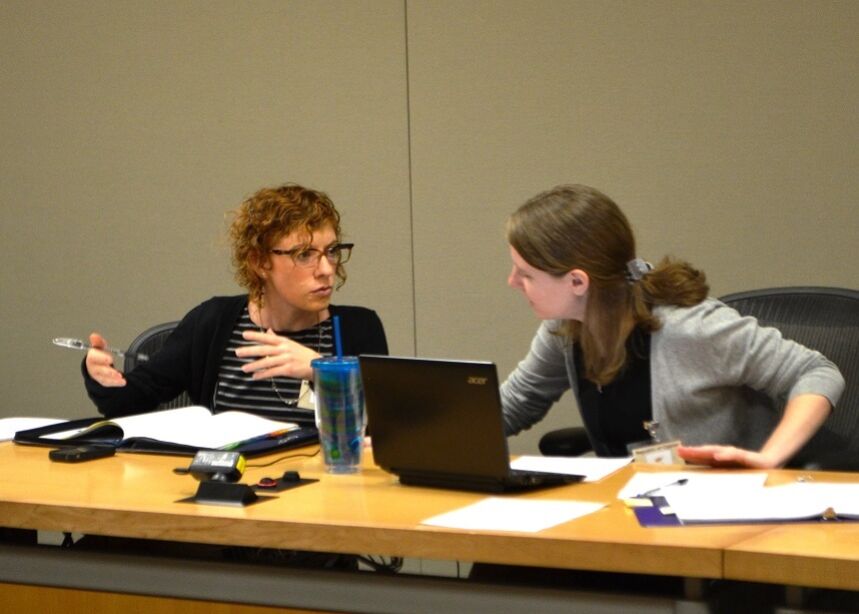November 13, 2014
Students gain international diplomacy skills through strategic crisis negotiation

[[nid:4860]]
“Our goals are to demilitarize the country, and become a sovereign nation, with a strong federal government,” said Penn State School of International Affairs student Jonathan Reich. “We also need a peaceful coexistence with the Turkish-Cypriots.”
Reich and five fellow SIA students, acting as a United Nations delegates representing the country of Cyprus, began their team meeting focusing on the schedule of negotiations with the six other student teams representing interested countries in the International Strategic Crisis Negotiation Exercise, which took place on Nov. 7 and 8 at the Lewis Katz Building.
The conflict
On the students’ agenda for the simulated peace conference was the resolution of the complex problem of territorial disputes. The Cyprus dispute is an ongoing conflict on the Mediterranean island between its population of Greek Cypriots and Turkish Cypriots, as well as between their respective states, Greece and Turkey. SIA student delegates represented Cyprus, Turkey, Turkish-Cypriots, and Greece, as well as the United Kingdom, the European Union, and the United States.
One week before the exercise began, the students were given a packet with information about the weekend’s scenario and their country-specific objectives. The actual simulation centered on a series of negotiation sessions among the country teams. Students gathered in the Lewis Katz Building on a Friday night, to begin the exercise, which ended Saturday afternoon.
“We’re no longer at Penn State University in the Lewis Katz Building. We are now in the United Nations in New York City in 10 hours of free negotiation. And you are all no longer students, but delegates from your respective countries,” said U.S. Army Col. Marty Clauson, one of the organizers from the U.S. Army War College. “Think of your national interests, and think of the passion of a person from that community brings to these negotiations, and don’t you give up on your national interests for the sake of a negotiation.”
The exercise
The International Strategic Crisis Negotiation Exercise was created by the Army War College to train high-level international military officers, but it was adapted for universities about 10 years ago. It’s designed to give hands-on experience, negotiation strategizing, and diplomacy skills to those who may someday have the task of resolving real world conflicts.
While the exercise was largely student driven, faculty members from the School of International Affairs and Army War College personnel were on hand to lend guidance drawn from their own career experience.
Tiyanjana Maluwa, director of the School of International Affairs, played the part of the U.N. special representative and opened the negotiation sessions. He explained the U.N.’s objective is to facilitate a solution to the 50-year-old territorial dispute, and he will be the primary mediator.
“Aim to approach this process in the spirit of compromise,” advised Maluwa. “But remain faithful to your country’s objectives.”
The negotiations
Maluwa then dismissed the delegates to begin their team meetings and negotiation sessions. In the team Cyprus negotiation room, during the team’s introductory briefing session, the student delegates mapped out a strategy to negotiate demilitarization of their country by Turkey and the U.K., and their need for a strong, independent government. After this first team meeting, the 15-minute negotiation sessions with other country teams began. In the fast-paced meetings, occurring in quick succession, the countries seemed to find middle ground. Cyprus team member and SIA student, Alfredo Malaret, came back to his fellow delegates from his negotiation session with the U.K. and declared an unexpected small victory.
“The U.K. will agree to demilitarization,” he said confidently. “Let’s meet with all the other countries before we meet with Turkey, have them agree to support us and then have everyone press Turkey.”
At the end of the Friday night negotiation sessions, the Cyprus team left pleased and satisfied they were making progress.
While the Cyprus dispute is based on a real- issue, overnight in this simulated scenario, the conflict escalated. Saturday morning, tensions were high. Ties were loose and sleeves rolled up. The Cyprus team was not feeling so confident any more.
That morning, Turkey had issued a press release stating that because the Cypriot delegation had refused meeting requests the previous evening, Turkey had moved 15,000 troops onto Cyprus. Negotiation sessions continued throughout the day. The peace talks did not end neatly. The simulation accurately reflects real life where countries have varied and sometimes irreconcilable objectives.
“Don’t get discouraged if you haven’t solved the Cyprus equation as the current disputes are historical and have been going on for decades,” said Clausen. “There is no winning or losing. It’s about experiential learning and about putting ourselves in a situation that will build our skills for negotiating and for diplomacy.”
The experience
An exercise review is held at the end of the two-day program. Clauson spurred the students to evaluate the “why” of their decisions during negotiations, and examine how the negotiations unfolded.
“The learning point was to remain faithful to your country objectives, but also embody the spirit of give and take, and this automatically creates tension,” he said. “You learned this and became more skilled in negotiation by doing, and that is the experiential learning environment.”
The goal of the exercise is to equip students with the skills to perform in this type of setting. They gain the ability to work as part of a team, to negotiate, and to collaborate with other people who have different points of view.
“Engaging with you makes me feel better about the future with you negotiating in it,” Clauson said. “You were focused, you cared, you were thoughtful and you took advantage of this experience. Keep at it, learn, and master your craft.”
